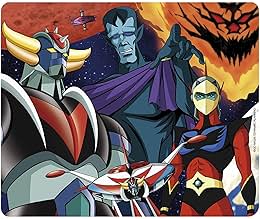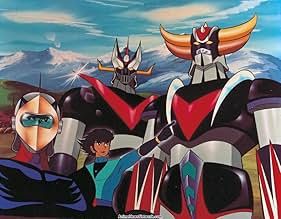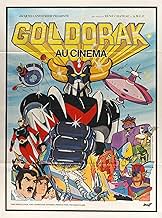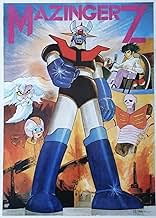AVALIAÇÃO DA IMDb
8,4/10
2,7 mil
SUA AVALIAÇÃO
Adicionar um enredo no seu idiomaThe young Prince of planet Fleed flees his destroyed homeland aboard the UFO Robot Grendizer. On Earth, aided by a scientist and allies, he battles Vega's forces sent to capture Grendizer an... Ler tudoThe young Prince of planet Fleed flees his destroyed homeland aboard the UFO Robot Grendizer. On Earth, aided by a scientist and allies, he battles Vega's forces sent to capture Grendizer and conquer or destroy the universe.The young Prince of planet Fleed flees his destroyed homeland aboard the UFO Robot Grendizer. On Earth, aided by a scientist and allies, he battles Vega's forces sent to capture Grendizer and conquer or destroy the universe.
Explorar episódios
Avaliações em destaque
This bland robot show (which aired as 'Goldorak' as I remember it) lacked the amorality, female nudity and blood splattering violence of 'Albator, le corsair de l'espace'(another children's cartoon on French tv in Canada at the time) -- thus it was less interesting to young boys in my grade.
Interestingly, the Quebec courts passed a law in 1999 forbidding parents from naming their child 'Goldorak.' I'm not making this up.
Interestingly, the Quebec courts passed a law in 1999 forbidding parents from naming their child 'Goldorak.' I'm not making this up.
The 3rd of Go Nagai's mecha, Grendizer carries over much of what made Mazinger Z and Great Mazinger successful, but manages to freshen things up. Even though Kabuto Koji is present, it feels a lot more like a standalone series.
The art and the animation are much cleaner than the previous entries in the catalog, often closer to the more polished OVAs. The sound design is also vastly superior.
The silly and often annoying comic relief element is not as omnipresent as it was in Great Mazinger, where Boss is often the focus of attention for much of the episode. In fact, thankfully enough, Boss is only featured in a handful of episodes. Grendizer's own cast of silly characters such as Danbei and Banta is somewhat easier to ignore for the most part. And thankfully, there are no such absurdities as taking crows either.
Even if it's made for kids, the tone is more serious, with romantic and even tragic elements, and the characters have a lot more depth.
And this is reinforced by the extraordinary music of Shunsuke Kikuchi, one of the great Japanese composers of the late 20th century. The score is full of pathos and remarkably dynamic, often reminiscent of Ennio Morricone. The music alone gives much more depth to the series than what you find in Mazinger Z and Great Mazinger.
Of course, the series has its share of fillers but overall it is very enjoyable.
I would recommend watching it in Japanese if you do have that option, as the progression of the series makes more sense. The translated versions can sometimes feel as though they were done in batches of a few episodes, without any real notion of the overarching plot. That being said, I grew up watching it in French, and I can attest that they did a fantastic job with that version, despite some issues. I assume that the same goes for the Arabic and Italian versions, seeing how beloved this series remains in France, Quebec, Italy and some Arab countries almost 50 years later.
The art and the animation are much cleaner than the previous entries in the catalog, often closer to the more polished OVAs. The sound design is also vastly superior.
The silly and often annoying comic relief element is not as omnipresent as it was in Great Mazinger, where Boss is often the focus of attention for much of the episode. In fact, thankfully enough, Boss is only featured in a handful of episodes. Grendizer's own cast of silly characters such as Danbei and Banta is somewhat easier to ignore for the most part. And thankfully, there are no such absurdities as taking crows either.
Even if it's made for kids, the tone is more serious, with romantic and even tragic elements, and the characters have a lot more depth.
And this is reinforced by the extraordinary music of Shunsuke Kikuchi, one of the great Japanese composers of the late 20th century. The score is full of pathos and remarkably dynamic, often reminiscent of Ennio Morricone. The music alone gives much more depth to the series than what you find in Mazinger Z and Great Mazinger.
Of course, the series has its share of fillers but overall it is very enjoyable.
I would recommend watching it in Japanese if you do have that option, as the progression of the series makes more sense. The translated versions can sometimes feel as though they were done in batches of a few episodes, without any real notion of the overarching plot. That being said, I grew up watching it in French, and I can attest that they did a fantastic job with that version, despite some issues. I assume that the same goes for the Arabic and Italian versions, seeing how beloved this series remains in France, Quebec, Italy and some Arab countries almost 50 years later.
Being in North America, I only got 26 episodes of the whole series as a kid. The only reason I remember it is because of the "movie" we rented so often, where Jim Terry Productions had taken scenes from several eps and cut them together, with some fresh voiceovers.
I just got hold of the entire series in Japanese with English subs this year. I had NO idea it had so many underlying themes, like belonging, protecting the environment, learning to rely on others, PTSD, and more. And Hikaru/Brenda's story arc was awesome.
My only gripes are the 70s-style comic relief. Danbi/Panhandle is annoying as hell, whether in English or Japanese. Boss is annoying, and Banta/Carlos usually is, too. It is also very plot-driven, e.g., Koji/Lance lights sticks of dynamite to free Hikaru from a seaweed trap...underwater. And sometimes Duke Fleed/Orion Quest uses the spazer to tag-team against a foe, and sometimes he doesn't. That sort of thing.
But was also the predominant way of writing cartoons back then. That they tackled such heavy themes as the after-effects of war on a person really surprised me.
Oh! One other thing that was so beautiful: almost every episode ends with a view of the sun, either direct or as a background. It was a lovely touch to show that this show is Japanese.
The American version that I watched as a kid erased almost all signs of the show's actual location. Given the American-style ranch, it was easy to do. And although I haven't watched the full French series yet, I've noticed the erasure, too, where possible. Heck, even the subtitles of the Japanese original that I have sometimes erase "Japan" or "Japanese" for English speakers.
But to demonstrate with actual dialogue from the scene in ep 1 where Koji lands his TFO at the ranch:
1. Japanese original: Koji confirms he's Japanese (he says, "Nihonjin"), not an alien.
2. American dub: "I'm more human than you are!" 3. French dub: "I'm a friend."
So, all in all, a beautiful series that's tons of fun, and you can hear the voice actors having fun while they're at it.
"Grendizer, go!"
I just got hold of the entire series in Japanese with English subs this year. I had NO idea it had so many underlying themes, like belonging, protecting the environment, learning to rely on others, PTSD, and more. And Hikaru/Brenda's story arc was awesome.
My only gripes are the 70s-style comic relief. Danbi/Panhandle is annoying as hell, whether in English or Japanese. Boss is annoying, and Banta/Carlos usually is, too. It is also very plot-driven, e.g., Koji/Lance lights sticks of dynamite to free Hikaru from a seaweed trap...underwater. And sometimes Duke Fleed/Orion Quest uses the spazer to tag-team against a foe, and sometimes he doesn't. That sort of thing.
But was also the predominant way of writing cartoons back then. That they tackled such heavy themes as the after-effects of war on a person really surprised me.
Oh! One other thing that was so beautiful: almost every episode ends with a view of the sun, either direct or as a background. It was a lovely touch to show that this show is Japanese.
The American version that I watched as a kid erased almost all signs of the show's actual location. Given the American-style ranch, it was easy to do. And although I haven't watched the full French series yet, I've noticed the erasure, too, where possible. Heck, even the subtitles of the Japanese original that I have sometimes erase "Japan" or "Japanese" for English speakers.
But to demonstrate with actual dialogue from the scene in ep 1 where Koji lands his TFO at the ranch:
1. Japanese original: Koji confirms he's Japanese (he says, "Nihonjin"), not an alien.
2. American dub: "I'm more human than you are!" 3. French dub: "I'm a friend."
So, all in all, a beautiful series that's tons of fun, and you can hear the voice actors having fun while they're at it.
"Grendizer, go!"
10ibbl
Grendizer appeared for the first time in Arab World at the 80's as a complete two-season Arabic dubbed show. It gained a huge popularity among the Arab children in the 80s, especially because dubbed cartoons are very rare at that time. Grendizer popularity in Arab World even very much exceeded Mazinger's; especially in Saudi Arabia where Mazinger has never been shown on TV.
The show is still being aired occasionally on both Space Toon and ART Teens (free-to-air Arabic satellite channels) which can be received in Middle East, parts of Africa, Europe, and Asia on the Egyptian TV satellite (Nile Sat). Also VHS tapes for the complete show (19 tapes)are being sold in Saudi Arabia.
Grendizer fans can obtain more information about the show on this website (http://www.grendizer.net).
The show is still being aired occasionally on both Space Toon and ART Teens (free-to-air Arabic satellite channels) which can be received in Middle East, parts of Africa, Europe, and Asia on the Egyptian TV satellite (Nile Sat). Also VHS tapes for the complete show (19 tapes)are being sold in Saudi Arabia.
Grendizer fans can obtain more information about the show on this website (http://www.grendizer.net).
OK, the animation may be stiff and the characters cardboard, but this show carries great memories for thousands of people around the world. Mildly successful in Japan, "Grendizer" aka "Goldorak" or "Goldrake" was one of the first Japanese cartoons to achieve such great success and retain a cult following for such a long time. Even today, the struggle of the hero Actarus (aka Duke Fleed) against the evil hordes of "Great Strateguerre" Vega give me shivers down my spine! BTW, among the corny aspects of the show, which add to its appeal : why the heck does Vega keep sending his giant robots ONE BY ONE (gettings their asses kicked by Grendizer episode after episode) instead of sending them all in one big assault? Beats me. Talk about a lousy galactic overlord! Seeing a Grendizer episode is like a fountain of youth to me ! I just can't get enough of its cheesy charm!
Você sabia?
- CuriosidadesWas dubbed to Arabic by (the Lebanese TV company) in Lebanon in the early 80's under the name (Moghamart al Fadaa) and gained a huge popularity among the children, teenager and adults as being one of the first Anime series to be completely dubbed to Arabic.
- ConexõesEdited from SF Saiyûki Starzinger (1978)
- Trilhas sonorasUfo Robot
(Italian Version)
Written by Luigi Albertelli, Ares Tavolazzi and Vince Tempera (as Vince Tempera)
Performed by Cosmic Connection
Principais escolhas
Faça login para avaliar e ver a lista de recomendações personalizadas
- How many seasons does UFO Robo Grendizer have?Fornecido pela Alexa
Detalhes
- Data de lançamento
- País de origem
- Central de atendimento oficial
- Idioma
- Também conhecido como
- UFO Robo Grendizer
- Empresas de produção
- Consulte mais créditos da empresa na IMDbPro
Contribua para esta página
Sugerir uma alteração ou adicionar conteúdo ausente

































